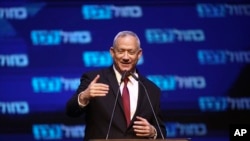With no clear winner from Israel's national election, Prime Minister Benjamin Netanyahu called Thursday for his main challenger Benny Gantz to join in forming a unity government.
In a video message, Netanyahu said that although he had campaigned for establishing a right-wing government, "the election results show that this is not possible."
He called for cooperation and urged Gantz to quickly set up a "broad unity government."
Gantz, of the centrist Blue and White Party, has said he would not join a unity government as long as Netanyahu remains head of the Likud Party. A spokesman said Gantz would make his own statement later Thursday.
No majority
Both parties fell short of the 61 seats needed to form a majority in the 120-seat Parliament. With nearly all the votes counted Thursday, Blue and White had 33 seats to Likud's 31, with their broader coalitions still falling short of a majority.
Avigdor Lieberman is seen as a potential kingmaker in the absence of a majority party. Lieberman, head of a party called Yisrael Beytenu (Israel is Our Home) supported primarily by Russian immigrants, won nine seats in this election, almost doubling his strength.
He has repeatedly said he favors a unity government, which would mean a government including Gantz's Blue and White, Netanyahu's Likud, and his own party.
"A national unity government, a broad liberal government. We will not join any other option. From our point of view, no other option exists," Lieberman said, speaking outside his home in the Jewish settlement of Nokdim.
He laid out a series of demands, including civil marriage in Israel. Currently, the ultra-Orthodox Rabbinic authorities have sole control of marriage and divorce in Israel. He also insisted that all ultra-Orthodox students study a secular curriculum of math and science, and that public transportation operate on the Jewish Sabbath.
After the last election in April, Netanyahu was just one seat short of a 61-seat majority. But Lieberman refused to join his government, which was set to include the ultra-Orthodox, unless the government passed a law to draft ultra-Orthodox yeshiva students into the military — a hot-button issue that has led to violent ultra-Orthodox demonstrations.
National unity
This time, a national unity government seems more likely.
"Almost certainly this, what we can call a broad mainstream unity government will exclude the hard ideological camps on the right and the left," said analyst Yossi Klein Halevi of the Hartman Institute. "That's the only way you can have these two parties sitting together is if their satellite parties are excluded, because the satellite parties are perceived by each party to be too extreme. And so, the coalition again will have to pull more toward the center."
Netanyahu is facing a series of corruption charges, and police have recommended he be indicted on three of them. He is supposed to have a final hearing before indictment in the next month.
What's next
Once the final results are in, Israeli President Reuven Rivlin will call each of the party heads to his office for consultation and ask each to recommend either Netanyahu or Gantz to form a government.
All of this will probably take several weeks.
"We might enter a period of days and perhaps weeks, when it is unclear who is going to be the prime minister," said Yohanan Plesner, president of the Israel Democracy Institute. "This is an unprecedented situation, because neither Mr. Netanyahu has a majority of 61 nor does Mr. Gantz. So, we are about to enter a period of political uncertainty."
Palestinian Foreign Minister Riyad al-Maliki said Wednesday he is prepared to restart peace talks with whomever is able to form a new Israeli government. But he did not say if that includes Netanyahu, under whose leadership peace with the Palestinians has been elusive.






